
views
Using Good Judgment

Tell the truth. In most cases, being honest and direct is the best course of action. It shows that you’re willing to own up and take responsibility and that you respect the teacher enough not to try to mislead them with a cooked-up story. Explain why you didn’t do the homework--maybe you forgot about the assignment, got home late, fell asleep, etc. Don’t sugarcoat your reason, but do use some discretion; if you didn’t do your homework because you were at an all-night kegger, keep your reason general (ie, “I didn’t get home until late”) rather than overly specific (ie, “I was too busy doing keg stands”). Apologize. After giving your reason, sincerely apologize. Don’t gloss over this part--the sincerity of your apology will impact how likely your teacher is to want to help you. If you don't feel comfortable talking to the teacher directly, feel free to send them an email or leave them a note. Explain that it won’t happen again--and make sure it doesn’t. Let your teacher know that this was a rare instance of you lapsing on a responsibility and that you’ll be careful that it doesn’t happen again. And--this part is important--keep your word. If you make forgetting your homework habitual, your teacher will not only stop believing your excuses, they’ll rapidly become less sympathetic to your apologies. Ask for another day to finish the assignment. The best case scenario here is that your teacher will grant you extra time to complete the assignment and won’t penalize you for turning it in past the original deadline. More likely, though, your teacher will offer to let you turn in the assignment late, for partial credit. Don’t gripe about or be ungrateful for partial-credit--it will make it less likely that your teacher will extend you a similar opportunity in the future.

Explain that you tried but didn’t understand the assignment. This excuse has the virtue of making it seem like you at least tried to do the homework and that there’s a reasonable cause why you couldn’t finish. Ask the teacher to help you understand the assignment and to let you have another chance at completing it. This both buys you more time and has the added benefit of getting you one-on-one homework help as well.

Be creative. If all else fails and you have to concoct a story, at least make it a good one. If the story’s creative or amusing enough, your teacher might cut you some slack simply because you didn’t give them one of the same boring excuses they always hear. For example, maybe it just so happened that your parents went out last night and left you with a family friend who turned out to be a clairvoyant and burned all of your homework because he looked into the future and saw that if he didn’t destroy it all your cat would rip your homework to shreds while you slept and you would breathe in a fatal amount of air-borne paper bits and choke to death.
Avoiding Bad Excuses

Don’t be obvious. One of the most important parts of getting a little leeway from your teacher is to not insult their intelligence. You’re not the first student to forget homework and try to get out of it. Your teacher has probably heard a list of excuses longer than the number of years you’ve been alive, so don’t go with the first obvious or lame excuse that comes to your head. It probably won’t get you anywhere. It should be obvious, but don’t use “the dog ate my homework.” You might as well not even bother coming up with an excuse at all. Don’t just say “I lost it” unless you can come up with a believable set of extenuating circumstances to explain how it got lost. Saying it just got lost randomly is pretty transparent.
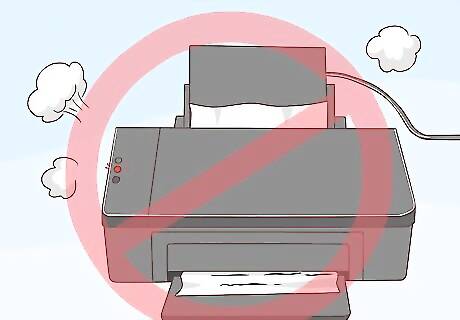
Don’t blame technology. Saying your printer didn’t work or your computer froze is a last-generation excuse. With the ubiquity of printers and cloud storage, saying technology mysteriously hijacked your homework is a pretty thin excuse. Instead of blaming the printer or your laptop, etc., explain that you had trouble when you were trying to print (or whatever) the homework right before class but that you’ll email it to your teacher by the end of the day. You can buy more time with that, and quickly type it up. Just be sure you actually do send it to them by the end of the day--preferably by 5 pm.

Don’t plead ignorance. Saying you didn’t know it was due or weren’t in class when it was assigned won’t work, for three big reasons. First, since it’s your responsibility, not theirs, to make sure you’re up-to-date on assignments, this excuse is pretty much like telling the teacher that it was your own fault. Second, because, from your teacher’s point of view, an entire classroom of other students managed to find out about and do the homework, so it clearly isn’t as hard as you’re making it out to be. And finally, the ignorance excuse won’t work because when you’re absent, your teacher expects that you’ll find out everything you missed. If didn’t, your teacher will again see it as your own fault.
Avoiding the Situation in the First Place
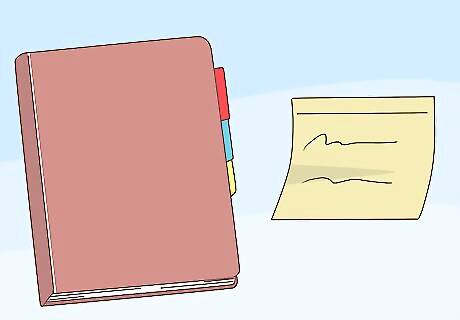
Make a homework game-plan. Relying on excuses to get you out of homework isn’t a good plan for the long-term. If you find yourself frequently forgetting or otherwise not doing your homework, you need a better game-plan. Start by writing down every assignment and its due date as soon as it’s assigned. Be sure to write all of your assignments down in the same place so you don’t miss any or have to go on a desperate search every time you want to know what’s due. A day planner, dedicated homework notebook, or scheduling app are all good options.
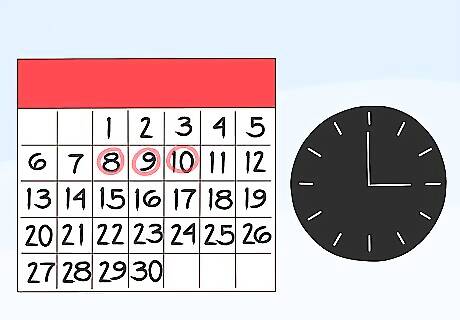
Have a homework schedule. Know when your assignments are due and have a schedule in place that will help you complete each assignment by its due date. Whenever you get an assignment, estimate how long it will take to complete and set aside the necessary time accordingly. If it’s an assignment that will take several days or even several weeks, set aside as many blocks of time as you’ll need to complete it over that span of time.
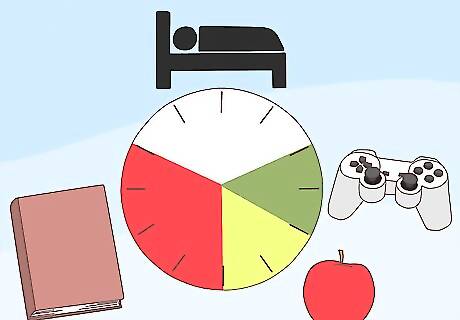
Make homework a routine. Set aside a period of time to do homework each night. Preferably make it at the same time every night so it becomes part of your routine. Don’t procrastinate on homework--don’t let yourself play video games or chat on Facebook until you’ve finished your night’s assignments. Do the harder assignments first. Getting the harder work out of the way first is a more efficient and rewarding use of your time. Reader Poll: We asked 159 wikiHow readers how to avoid making the same mistake, and 8% said they would ask loved ones to hold them accountable. [Take Poll] While this may not be the best strategy according to our readers, try making a routine for yourself.
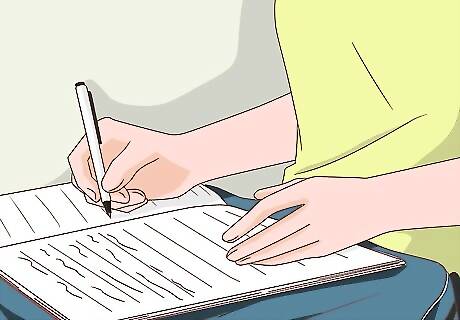
Use free or in-between times to do homework. If you find yourself struggling to finish all of your homework because of time constraints, use small bits of downtime to help you make more of a dent in your work. If you have a study-hall period, a free period, a few minutes between classes, a 10-15 minute bus ride home, etc., use that time to work on homework. Sure, you’d rather be talking to friends or playing on your phone, but if you want to have your homework done, you’ll need to actually take the time to do it.

Ask for help. If you find yourself getting bogged down by homework or can’t get the assignments done because you’re struggling to understand the subject matter, ask for help. Start by approaching the teacher. Explain your difficulties and ask for their help. That’s what your teachers are there for, after all--to help you learn. (And if they show any reluctance to help, remind them of this fact.) They’re the best source of help since they’re the ones making and grading the homework, and having the help of an insider is often invaluable. Get help from a classmate. If your teacher isn’t able to give as much help as you need, supplement their help with help from a classmate who understands the material and is doing well in the class. If you aren’t sure who that might be, ask your teacher for suggestions. Get a tutor. Many schools offer free peer-tutoring services that can be a significant help. Ask your teacher or an administrator whether such services are available. If not, consider looking into hiring a tutor. There are a number of professional tutoring services to choose from, or you might try hiring a local college student for tutoring help.

Cut out distractions. Like it or not, studying requires focus and concentration. Consequently, a large part of not getting homework done has to do with distractions. Even if you think you’re a great multi-tasker, trying to do homework while also texting, catching up on Facebook, and tweeting about how much you hate homework is actually hurting you more than helping you get through the process. Moreover, though multitasking can be an asset for some activities, it isn’t an asset when studying. When you’re multitasking, your mind leaves your current train of thought (like, say, trigonometry) and takes up a new train (maybe texting a friend about tomorrow’s plans), and the result is that you end up doing worse on both. Find a quiet, distraction-free space to do your studying. The better you’re able to concentrate, the better you’ll do on your work and the more quickly you’ll get through it. Put away or turn off anything you know will distract you (your phone, Facebook alerts, whatever). If you find yourself being distracted by thoughts of other things you should or want to be doing, keep a piece of paper next to you where you can write down those thoughts as they come up. Don’t dwell on them, just write them down and know you can get back to them later. Set small goals and reward yourself when you achieve them. For example, set a goal to study for 15-20 minutes straight and then reward yourself with a small treat when you do so.










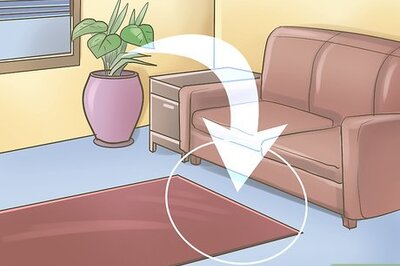








Comments
0 comment